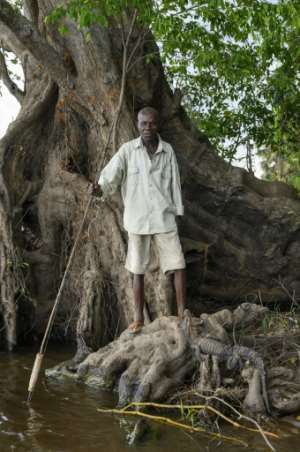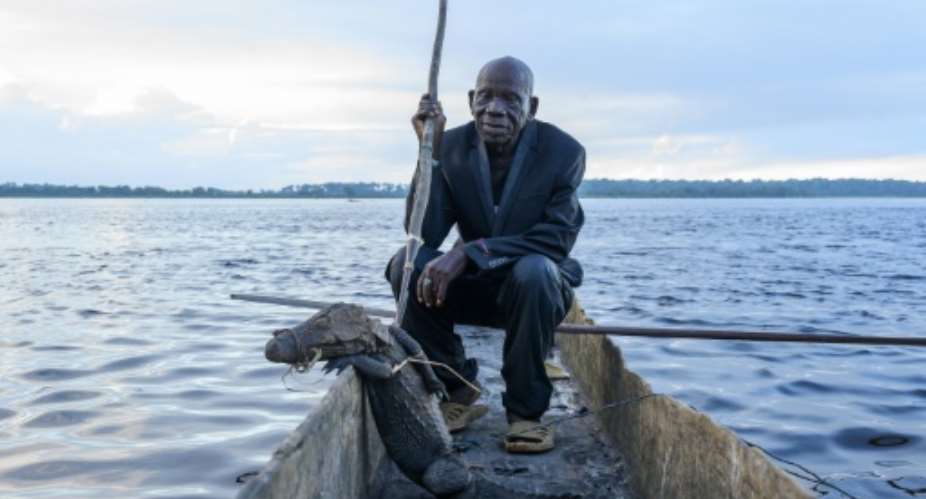The fearsome slender-snouted crocodile can make torch lights explode just with its eyes -- so the legend goes in the Democratic Republic of Congo.
Along the Congo River, such myths stay with the Banunu fishermen, even if their traditions and livelihoods are not what they once were.
Michel Koko, known as Lebe, 52, has been a fisherman for 10 years following in his father's footsteps.
 Legends about crocodiles remain strong among Banunu fishermen even if their livelihoods are not what they once were. By Arsene Mpiana (AFP)
Legends about crocodiles remain strong among Banunu fishermen even if their livelihoods are not what they once were. By Arsene Mpiana (AFP)
His hunting successes include crocodiles of all sizes, caimans, monitor lizards which can grow to more than three metres (yards) long, as well as all kinds of fish.
At 4,700 kilometres (2,920 miles) long, the Congo is the second longest river in Africa after the Nile.
Koko is Libinza, a tribe related to the Banunu-Bobangi, who since the 18th century have lived on the banks of the river in northwestern Equateur province and Mai-Ndombe province near the capital Kinshasa.
 Fisherman Molembe Yonga-Yonga, 74, poses with a crocodile and his spear on the banks of the Congo River. By Arsene Mpiana (AFP)
Fisherman Molembe Yonga-Yonga, 74, poses with a crocodile and his spear on the banks of the Congo River. By Arsene Mpiana (AFP)
The tribe is known for its extraordinary fishing and hunting superstitions.
"My father left me his spear," Koko said, convinced it is why he almost never misses his target.
Banunu fishermen often inherit spears and ancestral totems believed to have spiritual significance.
But their elders also bequeath them their "clairvoyance".
With the help of palm wine, makasu kola nuts or mondongo bush fruits, they claim to be able to see into the future.
 The Congo River is Africa's second longest after the Nile. By Arsene Mpiana (AFP)
The Congo River is Africa's second longest after the Nile. By Arsene Mpiana (AFP)
"If they see only death, they won't hunt that day," Koko says, in Mbandaka, the capital of Equateur province and about 700 kilometres (435 miles) upstream from Kinshasa.
He has a deep knowledge of crocodiles. He knows how to communicate with them, attracting them by imitating their cries, he said.
The "mbama" crocodile with a long snout responds by pouring water out of his mouth.
"That's the moment to deliver him the fatal blow," Koko said.
 Some fishermen recall the days when crocodile hunting was lucrative. By Arsene Mpiana (AFP)
Some fishermen recall the days when crocodile hunting was lucrative. By Arsene Mpiana (AFP)
But, with the short-snouted "ngando", it is more complicated.
"You have to position yourself in the middle of the pirogue (dugout canoe) because he can appear from anywhere," the hunter continued.
The animal possesses "infrared vision" and can deliver an electric shock, he said.
"If a crocodile bites you, it is important not to scream," Koko warned.
"If you say nothing, he will think you are a tree trunk and let go."
Like gold in bygone days
At the age of 91, Papa Baron Missiki reminisces on his days hunting crocodiles, as well as buffalos, antelopes, elephants and hippopotamuses.
He is now retired but his son, also called Missiki, keeps up the tradition.
 Fisherman Andre Boka, 45, in DRC's mighty Congo River. By Arsene Mpiana (AFP)
Fisherman Andre Boka, 45, in DRC's mighty Congo River. By Arsene Mpiana (AFP)
With pride for their community and their experience, the fishermen become nostalgic recounting their tales from years gone by.
Koko remembers a time when crocodile hunting was lucrative, back when the DRC was known as Zaire between 1971 and 1997.
President Mobutu Sese Seko was in power and crocodile skin was sought after for its supposed miraculous qualities such as protecting families against evil spirits, but also for use in the fashion industry.
 Fishermen take jobs in local businesses or invest in fish farming to make ends meet. By Arsene Mpiana (AFP)
Fishermen take jobs in local businesses or invest in fish farming to make ends meet. By Arsene Mpiana (AFP)
"We would leave to go hunting with bags of salt in the pirogue to ensure the conservation of their skin," Koko said.
"It was (like) gold at the time, we didn't care about their flesh."
Nowadays, the selling of wild crocodile skin "is forbidden" to preserve the species, adds the fisherman.
 The egg of a Nile crocodile captured in 1953 and brought to the Eala botanical garden in Mbandaka, DRC. By Arsene Mpiana (AFP)
The egg of a Nile crocodile captured in 1953 and brought to the Eala botanical garden in Mbandaka, DRC. By Arsene Mpiana (AFP)
He says animal numbers have dwindled on the river, which he puts down to overfishing, climate change and increased numbers of motorised boats on the waterway.
"We can only hunt the dwarf crocodile called 'ngokia' (locally) and sometimes the monitor lizard" known as the mbambi, Koko said.
"Seeing how easily dwarf crocodiles reproduce, it is impossible this species will disappear," he commented.
 Gerard Bokendaka, 64, on the banks of the Congo River. By Arsene Mpiana (AFP)
Gerard Bokendaka, 64, on the banks of the Congo River. By Arsene Mpiana (AFP)
To keep their heads above water financially, the fishermen take up jobs in local businesses, trade or invest in fish farming.
"How do we live without selling wild animals?" asked Lucie, a vendor at Lingunda market in Mbandaka.
"It enables us to pay for the children's school, the rent, everyday life."





 All is set for opening of Third African Media Convention today
All is set for opening of Third African Media Convention today
 Bolgatanga: Pupils of Azorebisi JHS study under trees
Bolgatanga: Pupils of Azorebisi JHS study under trees
 Roads Minister calls for institutional collaboration to address perennial Weija-...
Roads Minister calls for institutional collaboration to address perennial Weija-...
 Our record in road infrastructure unmatched – Akufo-Addo
Our record in road infrastructure unmatched – Akufo-Addo
 Government to disburse GH¢2 Million for needy dialysis patients
Government to disburse GH¢2 Million for needy dialysis patients
 Split between Socialists and hard-left damages chance of alliance before EU elec...
Split between Socialists and hard-left damages chance of alliance before EU elec...
 Subsidies for renal patients won’t collapse NHIS – Dr. DaCosta Aboagye
Subsidies for renal patients won’t collapse NHIS – Dr. DaCosta Aboagye
 Establishment of fire training schools under Akufo-Addo remarkable - Joe Ghartey
Establishment of fire training schools under Akufo-Addo remarkable - Joe Ghartey
 Abidjan-Lagos corridor: opening of the workshop to validate the results of the s...
Abidjan-Lagos corridor: opening of the workshop to validate the results of the s...
 Bawumia to unveil running mate in June — Sammi Awuku
Bawumia to unveil running mate in June — Sammi Awuku
